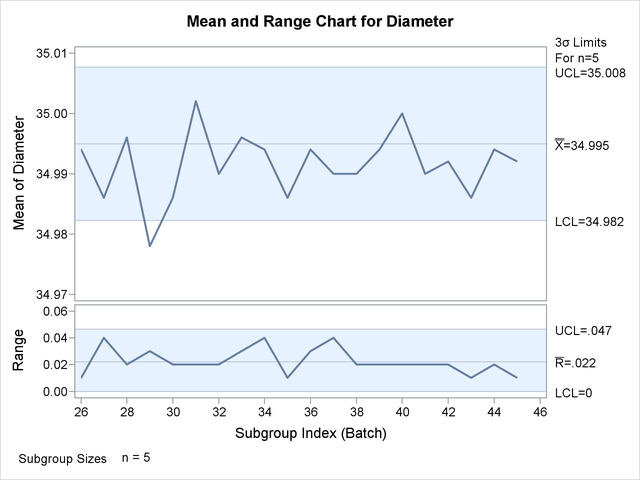XRCHART Statement: SHEWHART Procedure
Reading Preestablished Control Limits
See SHWXR1 in the SAS/QC Sample LibraryIn a previous example, the OUTLIMITS= data set saved control limits computed from the measurements in Wafers. This example shows how these limits can be applied to new data provided in the following data set:
data Wafers2;
input Batch @;
do i=1 to 5;
input Diameter @;
output;
end;
drop i;
datalines;
26 34.99 34.99 35.00 34.99 35.00
27 34.99 35.01 34.98 34.98 34.97
28 35.00 34.99 34.99 34.99 35.01
29 34.98 34.96 34.98 34.98 34.99
30 34.98 35.00 34.98 34.98 34.99
31 35.00 35.00 34.99 35.01 35.01
32 35.00 34.99 34.98 34.98 35.00
33 34.98 35.00 34.99 35.00 35.01
34 35.00 34.97 35.00 34.99 35.01
35 34.99 34.99 34.98 34.99 34.98
36 35.01 34.98 34.99 34.99 35.00
37 35.01 34.99 34.97 34.98 35.00
38 34.98 34.99 35.00 34.98 35.00
39 34.99 34.99 34.99 34.99 35.01
40 34.99 35.01 35.00 35.01 34.99
41 34.99 35.00 34.99 34.98 34.99
42 35.00 34.99 34.98 34.99 35.00
43 34.99 34.98 34.98 34.99 34.99
44 35.00 35.00 34.98 35.00 34.99
45 34.99 34.99 35.00 34.99 34.99
;
The following statements use the control limits in Waferlim to create ![]() and R charts for the data in
and R charts for the data in Wafers2:
ods graphics on; proc shewhart data=Wafers2 limits=Waferlim; xrchart Diameter*Batch; run;
The ODS GRAPHICS ON statement specifies that the ![]() and R charts are produced using ODS Graphics. The LIMITS= option in the PROC SHEWHART statement specifies the data set containing
the control limits. By default,[84] this information is read from the first observation in the LIMITS= data set for which
and R charts are produced using ODS Graphics. The LIMITS= option in the PROC SHEWHART statement specifies the data set containing
the control limits. By default,[84] this information is read from the first observation in the LIMITS= data set for which
-
the value of
_VAR_matches the process nameDiameter -
the value of
_SUBGRP_matches the subgroup-variable nameBatch
The charts are shown in Figure 17.112.
Figure 17.112: ![]() and R Charts for Second Set of Wafer Data (ODS Graphics)
and R Charts for Second Set of Wafer Data (ODS Graphics)

Note that the mean diameter of the 29th batch lies below the lower control limit in the ![]() chart, signaling a special cause of variation.
chart, signaling a special cause of variation.
In this example, the LIMITS= data set was created in a previous run of the SHEWHART procedure. You can also create a LIMITS= data set with the DATA step. See LIMITS= Data Set for details concerning the variables that you must provide.
[84] In SAS 6.09 and earlier releases, it is also necessary to specify the READLIMITS option to read control limits from a LIMITS= data set.
